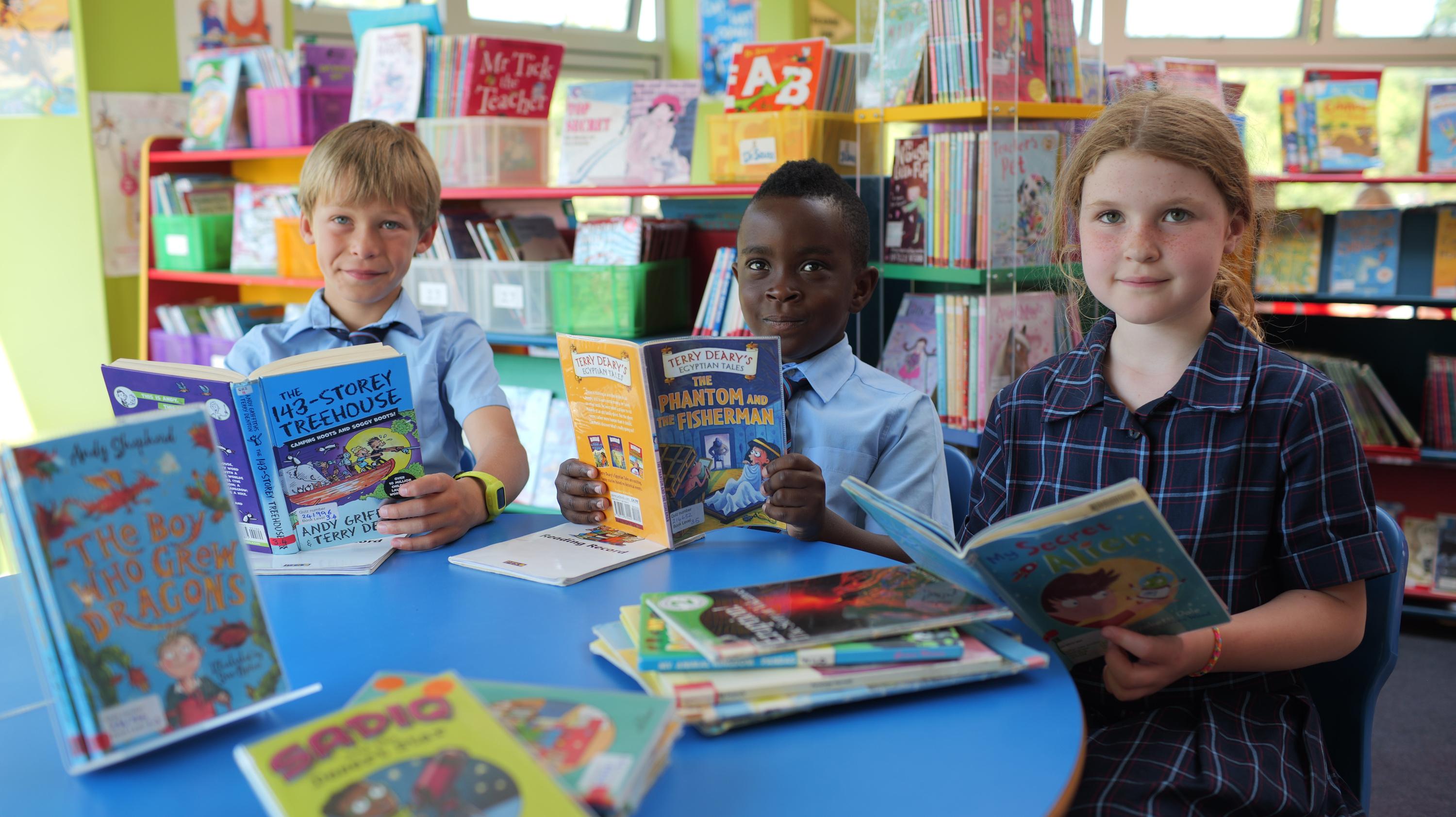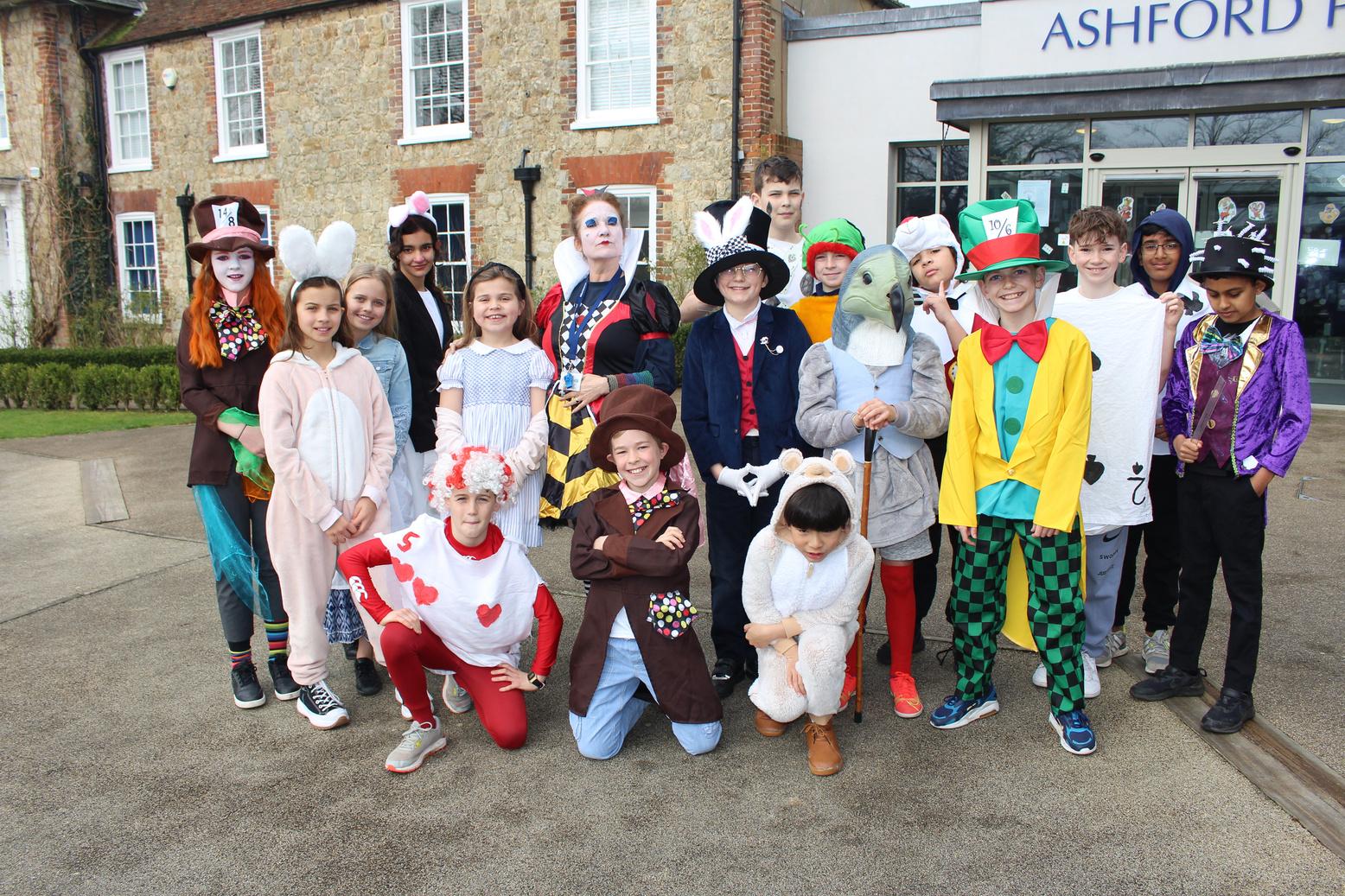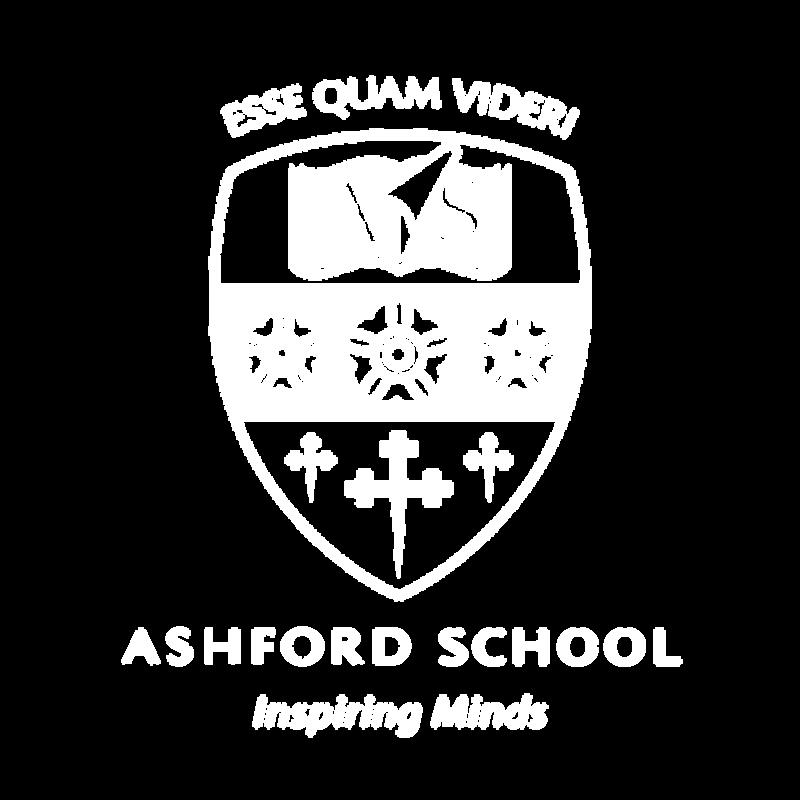English Faculty Handbook


English
READING, READING, AND MORE READING!
As a faculty, we aim to introduce and inspire the children to have a love of reading, giving them access to a world of imagination, facts and lifelong enjoyment.
We seek to develop curious and confident children who can connect with and assess the past, engage positively in the present and plan for a better, fairer future.
We want them to engage, debate, collaborate and become leaders equipped with knowledge and a thirst for discovering more about the world and the role they can play in shaping it.

01
02 Contents Subject Overview and Aims English Rationale Aims Curriculum Planning Reception Year 1 Year 2 Year 3 Year 4 Year 5 Year 6 Subject Organisation Trips and Memorable Events Enrichment Opportunities Assessment and Marking ..............................................................03 ............................................................................................................03 .........................................................................................................03 ................................................................................................................04 ........................................................................06 .......................................................................................................06 .............................................................................................................06 .............................................................................................................06 .............................................................................................................07 .............................................................................................................07 .............................................................................................................07 .............................................................................................................07 .......................................................................................08 ...........................................................................08 ...............................................................................08 ................................................................................09
Subject Overviews and Aims
English
Our broad English curriculum allows that children to develop a love of reading that will benefit them through their education; in addition to instilling a lifelong enjoyment. Having a firm ethos of the importance, enjoyment and benefits of reading from nursery upwards, we open a world of imagination, facts and opportunities to escape, relax, learn, imagine, predict, wonder, gain knowledge and gain insights into other lives and worlds past, present and future.
Writing, speaking and listening follow on and allow the children to communicate their own ideas, explain and develop their own comprehension and descriptions using the skills learnt and implementing the tools and ideas developed through reading. Spelling, punctuation and grammar are taught alongside ensuring academic rigour through each scheme of work.
Rationale
English is an integral part of life at Ashford Prep School and much of our English curriculum integrates with other areas of the School curriculum allowing cross-curricular opportunities in each year group. This approach ensures that children develop their English skills while exploring relevant content. A range of texts and books are used from fiction to non-fiction and poetry; from historic lives of London; tropical rainforests; mystical poems to futuristic time machines and topical discussions.
Furthermore, we place a strong emphasis on Spelling, Punctuation, and Grammar, preparing our children for their next steps and providing them with a solid foundation for future success.
03
Aims

In Pre-Prep we centre our English lessons around our wider curriculum units of work, which differ from year group to year group. Through these exciting units, the children will learn about a range of genres of writing, including fiction, poetry and non-fiction, where the children will get the opportunity to explore a variety of good quality literature by reading books, listening to them and even acting them out. They will learn about different sentence punctuation, descriptive language, rhyme and features of different types of text, as well as many other things. Every week, Years 1 and 2 also have a grammar lesson, in which the children will learn about a specific grammar area, such as nouns, adjectives or plurals. They will then have opportunities to use them in their own work.
At Ashford Prep School, we use the Read, Write, Inc. phonics scheme. In small groups, children learn with others at a similar level. Children and teachers alike appreciate the interactive lessons and we have seen the results of our phonics screening tests soar as a direct result of the implementation of this scheme. We have a vast range of reading books to encourage our children to read at home, sorted into stages to ensure they progress through the reading scheme. There is a range of genres within the reading scheme including: fiction stories, information texts, play scripts and poetry. As the children progress to the end of the reading levels, they can advance on to the accelerated reading scheme, which offers comprehension questions for a wide range of literature of all genres.
As the children move up to Prep, the Lower Prep children are taught by their form teacher and the Upper Prep children are set in ability groups. Lessons are focused on learning how to adapt the way they speak and write to suit different genres and audiences reading a range of texts to enable them to read and respond to comprehension and inference questions. They are encouraged to explore the use of language in fiction and non-fiction texts as well as learn how and why language is used, drawing inferences, skimming and scanning and deduction, which they then apply
04
independently. When answering comprehension questions, they are encouraged to use evidence from the text to support their ideas and answers. Through a range of engaging units, children develop and expand their speaking, listening, discussion, interaction and presentation skills. They learn the skills of planning, drafting, editing and proofreading their work. These skills will be formally put into practice when the children sit a writing and comprehension assessment.
Spellings are set every week, and the children will be taught to recognise spelling patterns, to enable them to spell accurately and to widen their vocabulary to enhance both their spoken and written language. In addition to this, the children are taught to proofread and edit with purpose, using their spelling work to enhance this process. Handwriting is continually monitored. Once a pupil’s handwriting is fluent, neat and legible, they are awarded their pen licence and are able to write in pen. Writing implements the grammar and punctuation taught and children use a range of resources and texts as platforms for their writing.
Children are expected to read regularly at home as well as at school with their form teacher, English teacher or another adult within school during the week to reinforce their reading ability as well as their understanding of the text. It is important to read a range of genres in order to foster a love of the written word.
Using the Accelerated Reading Scheme, they are encouraged to complete comprehension quizzes on every book read to show their understanding of the text. They complete regular STAR reading tests which adjust their reading levels and we set the children are set targets and awarded certificates throughout the year based on number of books and number of words read, and we are proud that a number of our children achieve Reading Millionaire status each year. In 2023, there were over 40 millionaires; reading over 125 million words by the end of the Summer Term! Our School library is always open and welcoming.
A love for reading is inculcated throughout a child’s time at the School; a culture which is evident during our annual Book Week, when the School hallways are transferred into scenes out of a popular book and all lessons are structured around story themes and creativity. Themes have ranged from Harry Potter to bedtime stories, villains to Alice in Wonderland. Children at Ashford Prep School LOVE to read!
05
Curriculum Planning
Reception
Autumn 1 Autumn 2 Spring 1 Spring 2 Summer 1 Summer 2
Our EYFS English curriculum is based on Communication and Language skills developing their writing fine motor skills and reading sounds.
Year 1
Autumn 1 Autumn 2 Spring 1 Spring 2 Summer 1 Summer 2
Stories with familiar settings: Why don't sharks eat broccoli?
Information texts and poetry on Senses
Year 2
Developing description: Is there life on mars?
Information texts and Poetry: Humorous poems
Fiction recount: Who’s Afraid of the Big Bad Wolf?
Traditional Tales and Instructions
Autumn 1 Autumn 2 Spring 1 Spring 2 Summer 1 Summer 2
Narrative and developing sentence structure: George and the Dragon
Personal Narrative: My Christmas Star
Recount: The Great Fire of London
Poetry: ‘Bathroom
Fiddler’ by Michael Rosen
Non-Chronological Report: What’s Where on Earth?
Developing Vocabulary: The Marvellous Fluffy
Squishy Itty Bitty
06
Year 3
Autumn 1 Autumn 2 Spring 1 Spring 2 Summer 1 Summer 2
Developing description: How can we use the story mountain in our own creative writing?
Year 4
Introduction to Poetry: How do I write a letter?
Developing dialogue: Why was Mr. Fox so Fantastic?
Reporting and Editing: How do I become an effective editor?
Poetry/Writing to entertain: What helps me
understand the full meaning of a poem?
Instruction: How do I write effective instructions?
Autumn 1 Autumn 2 Spring 1 Spring 2 Summer 1 Summer 2
Developing figurative language: Anasi the Spider and Horrid Henry
Writing to Inform: Diversity: Focus on black history
Year 5
Discussion: Esio Trot
Playscripts and Diary writing Mary Queen of Scots
Persuasion: Where can books take you?
Writing Short Stories: Imaginery Worlds
Autumn 1 Autumn 2 Spring 1 Spring 2 Summer 1 Summer 2
Character and setting Bushcraft: Where the Forest meets the Sea
Year 6
Recount and diary: Ernest Shakleton’s Journey
Description and short stories
StorySLAM and The Wreck of the Zanzibar
Character development The Wreck of the Zanzibar
Poetry and personification: Daffodils and Frankenweenie Diary writing Tadeo Jones and Egyptians
Autumn 1 Autumn 2 Spring 1 Spring 2 Summer 1 Summer 2
Poetry: Who was braver, Bess or The Highwayman?
Narrative and Predications: SeaBEAN
Short stories and non-fiction:
StorySLAM The Diary of Anne Frank
Discussion and recount: The Diary of Anne Frank
Poetry and non fiction: The Lion and Albert poem What if he didn't poke the lion?
Class Anthology: Book of Dreams: Memories
07
Subject Organisation
All children at Ashford Prep School have 4-hours of curriculum English lessons. Performing arts is separately timetabled. On top of this, children will spend dedicated reading time in form times and lessons across the week as well as allocated library time.
Children in Upper Prep are set for English groups. This is based according to teacher assessment, pace in lessons. During English faculty meetings and Pupil Progress meetings, possible movements of pupils are discussed.
Trips and Memorable Events
Our Inspiring Minds approach means that we are always striving to create memorable experiences for the children and English embraces this whenever possible. Our whole School book week in March celebrates Book Day and includes a full timetable of lessons and activities around reading including a theme and a dress-up day. Authors and online workshops are integrated into the week. Cross-curricular also ensures that English is linked across all areas of the curriculum. School residentials (Year 5 Bushcraft) and trips across the year ensure that these are integrated into the English planning.
Enrichment Opportunities
Our Enrichment programme is reviewed termly but has included many activities and clubs under the English Banner:
Debating Club
Book Club
APS News
Do A Project
Harry Potter club
08
Assessment, Marking and Monitoring
We use a varied range of methods to assess children’s understanding of each unit of work including:
Unit Reviews
Peer assessment
PSB self-assessment markers and evidencing
Answering of hook questions
End of Unit quizzes
Formal assessments
Showbie assignments
Self-guided coding with checklists
Self-marking activities
Head of Faculty learning walks
Termly Writing assessments
STAR reading tests
Every term a ‘Pupil Progress’ meeting is held to build a clear profile and track their progress.
Working Towards
Achieving
Working beyond
In relation to the learning objectives for that unit of work. This builds a clear pupil profile and is available for feedback to parents through consultation evenings and report documents. At the end of their time at Ashford Prep School each Year 6 pupil receives their PSB grade descriptors based on this achievement.

09

10

Great Chart, Ashford, Kent, TN23 3DJ +44 (0)1233 620493
co uk
admissions@ashfordschool
www.ashfordschool.co.uk







